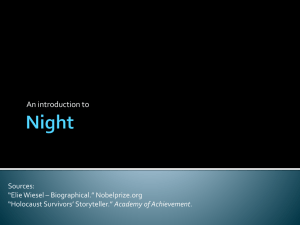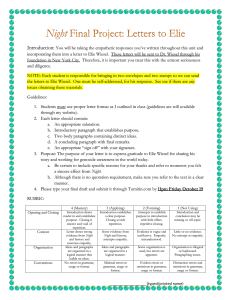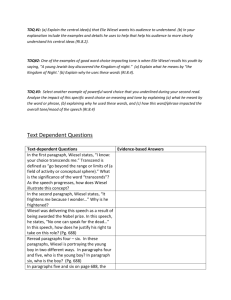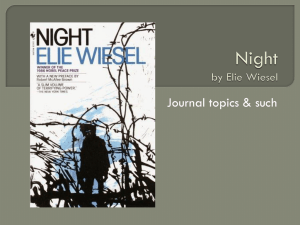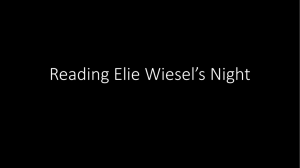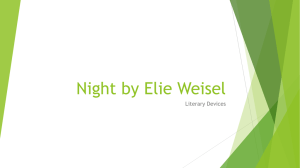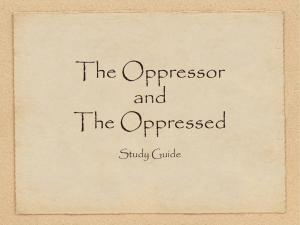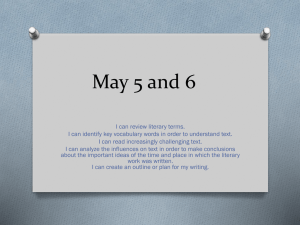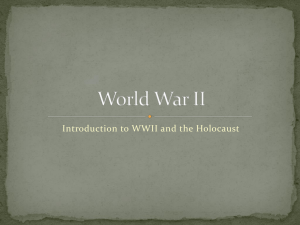Hope, Despair and Memory - Chandler Unified School District
advertisement
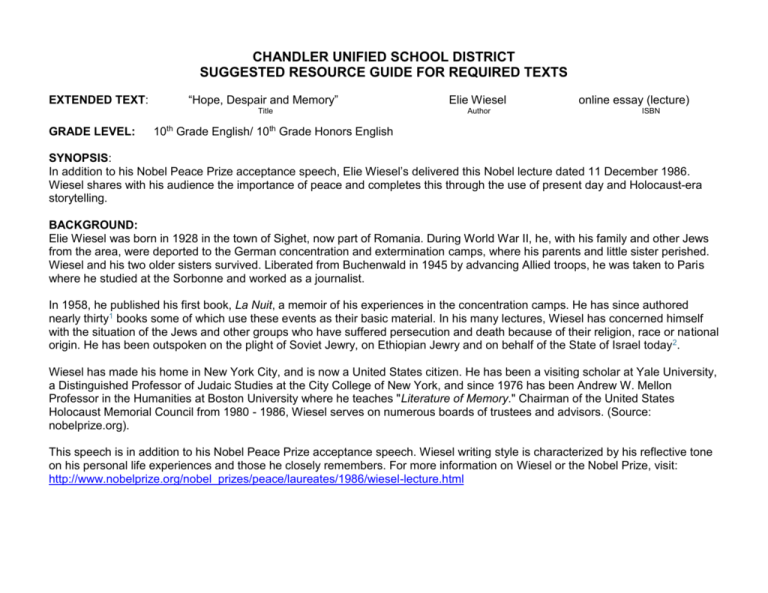
CHANDLER UNIFIED SCHOOL DISTRICT SUGGESTED RESOURCE GUIDE FOR REQUIRED TEXTS EXTENDED TEXT: GRADE LEVEL: “Hope, Despair and Memory” Elie Wiesel Title Author online essay (lecture) ISBN 10th Grade English/ 10th Grade Honors English SYNOPSIS: In addition to his Nobel Peace Prize acceptance speech, Elie Wiesel’s delivered this Nobel lecture dated 11 December 1986. Wiesel shares with his audience the importance of peace and completes this through the use of present day and Holocaust-era storytelling. BACKGROUND: Elie Wiesel was born in 1928 in the town of Sighet, now part of Romania. During World War II, he, with his family and other Jews from the area, were deported to the German concentration and extermination camps, where his parents and little sister perished. Wiesel and his two older sisters survived. Liberated from Buchenwald in 1945 by advancing Allied troops, he was taken to Paris where he studied at the Sorbonne and worked as a journalist. In 1958, he published his first book, La Nuit, a memoir of his experiences in the concentration camps. He has since authored nearly thirty1 books some of which use these events as their basic material. In his many lectures, Wiesel has concerned himself with the situation of the Jews and other groups who have suffered persecution and death because of their religion, race or national origin. He has been outspoken on the plight of Soviet Jewry, on Ethiopian Jewry and on behalf of the State of Israel today2. Wiesel has made his home in New York City, and is now a United States citizen. He has been a visiting scholar at Yale University, a Distinguished Professor of Judaic Studies at the City College of New York, and since 1976 has been Andrew W. Mellon Professor in the Humanities at Boston University where he teaches "Literature of Memory." Chairman of the United States Holocaust Memorial Council from 1980 - 1986, Wiesel serves on numerous boards of trustees and advisors. (Source: nobelprize.org). This speech is in addition to his Nobel Peace Prize acceptance speech. Wiesel writing style is characterized by his reflective tone on his personal life experiences and those he closely remembers. For more information on Wiesel or the Nobel Prize, visit: http://www.nobelprize.org/nobel_prizes/peace/laureates/1986/wiesel-lecture.html TEXT COMPLEXITY ANALYSIS: In the Reader and Task section, include specific concerns, modifications, scaffolding, or opportunities for differentiation—address how the text should be approached for diverse learners (gifted, honors, ELL, SPED). Quantitative: In addition to Wiesel’s Nobel Peace Prize acceptance speech (McDougal Little Literature Grade 10 p. 860), this text is listed as an exemplar text (in Appendix B of the Common Core) placed in the 9-10 grade band. However, quantitatively the text scores low for both readability measures. For ATOS (8.5) and Flesh Kincaid (7.8) this text falls within the 6-8 grade band for quantitative complexity. Qualitative: While the purpose of this text is easy to identify, the message and complexity of it lie in its expert use of language and organization. The piece is ideal for rhetorical study. If used as a rhetorical analysis, the speech’s qualitative measures are characterized by the author’s argument which is completed through an ethical appeal to his audience. While somewhat narrative in structure, the narration shifts occasionally lending to middle-high complexity. However, high knowledge demands are acknowledged for Wiesel’s exploration of Judaic and Hebrew language/cultural understanding. Reader and Task: Because this text is relatively easy to understand, the tasks demanded by the teacher’s lessons and classroom activities must be challenging. The text is perfect for rhetorical analysis, even for struggling readers. However, if a student is far below reading level, the teacher may consider limiting the amount of text offered for study – maybe just focus on Wiesel’s message or the lecture’s theme. MOTIFS/THEMES/ESSENTIAL QUESTION: Themes: Society is constantly struggling to make sound decisions. “Mankind must remember that peace is not God’s gift to his creatures, it’s our gift to each other.” Essential Questions: Can humanity triumph over evil? What’s the importance of remembering or the consequences of forgetting our past? LANGUAGE: Identify important vocabulary. Provide a focus standard for grammar/mechanics that works nicely with the extended text. Vocabulary Acquisition and Use Tier 2 Vocabulary Tier 3 Vocabulary (if applicable) transcend (paragraph 3) opaque (paragraph 3) accursed (paragraph 7) aberration (paragraph 8) xenophobia (paragraph 8) abhorrence (paragraph 13) Apartheid (paragraph 25) Hasidic (paragraph 1) Auschwitz (paragraph 8) Torah (paragraph 13) Talmud (paragraph 13) Treblinka (paragraph 19) Conventions of Standard English or Knowledge of Language focus standard: Standard Code 9-10.L.4 Standard Text Determine or clarify the meaning of unknown and multiple-meaning words and phrases. d. Verify the preliminary determination of the meaning of a word or phrase (e.g., by checking the inferred meaning in context or in a dictionary). Description of where and how it fits with the extended text Unfamiliar words and phrases used in text should be checked for inferred meaning to aid in the understanding of the essay. COMPANION TEXTS: Provide a series of short companion texts that will supplement the extended text and provide students with a deeper understanding of the themes, motifs, or context of the extended text. 1-3 Short Informational Texts Text Title and Author A short description of the text and how it relates to the extended text Label Difficulty: Advanced Grade Level Meant for Scaffolding 1. Speech by Elie Wiesel 1. A 23-minute video recording of a speech at the Nobel Centennial Symposia in Olso, Norway dated 7 December 2001. http://www.nobelprize.org/mediaplayer/index.php?id=1283 1. Grade Level 2. Nobel Prize Acceptance Speech by Elie Wiesel 2. McDougal Little Literature Grade 10 p. 860 or at http://www.pbs.org/eliewiesel/nobel/ 2. Grade Level 1-3 Short Literary Texts Text Title and Author 1. from Night by Elie Wiesel A short description of the text and how it relates to the extended text 1. Suggestion: Use excerpt from (McDougal Little Literature Grade 10 p. 854). This reading passage sheds light on a similar Wiesel theme – society’s struggle to make good decisions or the violation of human rights. Label Difficulty: Advanced Grade Level Meant for Scaffolding 1. Meant for Scaffolding STANDARDS-BASED ACTIVITIES: This activity will assist in the instruction of the extended text (consider: comprehension, vocabulary, grammar, close reading, etc.). Some materials (rubrics, graphic organizers, printables, handouts, student directions, etc.) will be added to the end of this document. Description ACTIVITY: CLOSE READING OF NOBEL LECTURE, “HOPE, DESPAIR AND MEMORY” Resources: “Hope, Despair and Memory” Literary Analysis Terms Text Dependent Questions In this close reading activity, students will first read the text independently, highlighting any portion of the text (including words or phrases) that are unfamiliar. Next, the students will hear the teacher read the essay aloud, this time Standards Addressed: TSW make annotated notations inferring the meaning of those words or phrases 9-10.L.4d during the reading. Next, TSW identify 5-8 literary analysis devices and then 9-10.L.3 determine the meaning of that are evident to them and will serve as a basis for a 9-10.RI.4 discussion. The teacher will then group students (4); two groups of two will share their findings and then turn to share with others. Lastly, the teacher will assign text dependent questions to guide their rhetorical discussions. WRITING PROMPTS: Argument/Opinion Prompt: o What does Wiesel’s essay reveal about humanity? Using rhetoric, write an essay that argues whether or not remember or forgetting our past is essential. Informational/Explanatory Prompt: o Explain how Wiesel’s essay is both similar and different from some of his other works. Narrative Prompt: o Based on personal experiences, describe a time in your life where __________. Research Prompt: o Research another Nobel Prize speech by any author. How do these authors, their accomplishments, and their writing compare? o As outlined by PARCC, the prompts above may occur in a variety of writing environments. Teachers should consider: Incorporating a mix of on-demand and review-and-revision writing assignments Including routine writing, such as short constructed-responses to text-dependent questions, to build content knowledge and provide opportunities for reflection on a specific aspect of a text or texts Integrating of a number of analytic writings that places a premium on using evidence, as well as on crafting works that display some logical integration and coherence. These responses can vary in length based on the questions asked and task performed, from answering brief questions to crafting longer responses, allowing teachers to assess students’ ability to paraphrase, infer, and ultimately integrate the ideas they have gleaned from what they have read. Over the course of the year, analytic writing should include comparative analysis and compositions that share findings from the research project Include narrative writing to offer students opportunities to express personal ideas and experiences; craft their own stories and descriptions; and deepen their understandings of literary concepts, structures, and genres (e.g., short stories, anecdotes, poetry, drama) through purposeful imitation.
